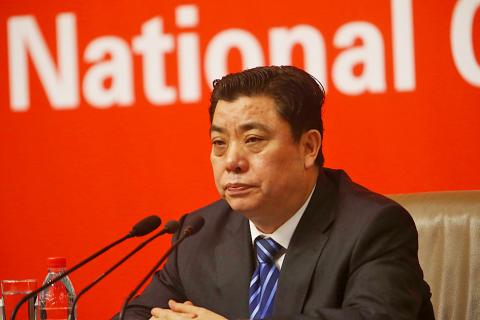China is using economic incentives to target 10 types of groups in Taiwan as part of its “united front” tactics, an unnamed government official said, citing national security intelligence.
The official said the groups targeted for engagement are local townships, young people and students, Chinese spouses of Taiwanese, Aborigines, pro-China political parties and groups, temples, descendants of Chinese who retain roots in China, labor groups, farmers’ and fishermens’ associations, and military veterans.
The government had previously estimated that China spends at least NT$10 billion (US$337.8 million) per year enticing Taiwanese to join united front efforts, but they believe that there might be more “invisible funding.”

Photo: CNA
China uses economic incentives when cultivating Chinese spouses, Aboriginal leaders, and local township and religious organizations, the official said, adding that Beijing might provide free visits to China or direct benefits to improve China’s approval rating.
China is also attempting to establish internal aid in Taiwan to direct public affairs and political activities, the official said.
Different levels of officials from China’s Taiwan Affairs Office (TAO), United Front Work Department (UFWD) of the Chinese Communist Party’s Central Committee and other groups have used Taiwan’s pro-unification groups and pro-China associations to arrange visits to Taiwan, gradually affecting exchanges using united front strategies, another unnamed source familiar with the matter said.
Trade groups, Chinese-funded firms and the local offices of Chinese businesses have members who also hold Chinese government positions, the source said, adding that these people cooperate with instructions from China.
During former president Ma Ying-jeou’s (馬英九) administration, Xiamen University’s Taiwan Research Institute and other Chinese think tanks researched Taiwan’s political and economic development and social sentiment for a long period in the name of academic cooperation and field research, the source said.
The organizations claimed that hotel costs were too high and rented homes in Taiwan for professors and students, the source said, adding that the groups used this opportunity to collect intelligence.
A suspected “price list” set by the TAO has emerged in a case involving New Party spokesman Wang Ping-chung (王炳忠), a national security official said.
Prosecutors have also found several million yuan in the accounts of other pro-China political parties and groups, the official said.
China has also hinted to political party members that if they gather military information in Taiwan, China would compensate them generously, while others have traveled to China to interact with national security officials and accept funds, the official added.
These cases are difficult to investigate, because it is not easy to prove that the money in those accounts was given by Chinese intelligence agencies or agencies involved with Taiwan, the official said.
Meanwhile, Chinese divisions involved with Taiwan are spread throughout several Chinese party, government and military divisions, including the UFWD, the Taiwan affairs system, think tanks and other divisions, the official said.
Taiwan has continuously tracked China’s attempts to influence Taiwanese politics and society, and has reacted appropriately, they added.

Taiwan is projected to lose a working-age population of about 6.67 million people in two waves of retirement in the coming years, as the nation confronts accelerating demographic decline and a shortage of younger workers to take their place, the Ministry of the Interior said. Taiwan experienced its largest baby boom between 1958 and 1966, when the population grew by 3.78 million, followed by a second surge of 2.89 million between 1976 and 1982, ministry data showed. In 2023, the first of those baby boom generations — those born in the late 1950s and early 1960s — began to enter retirement, triggering

ECONOMIC BOOST: Should the more than 23 million people eligible for the NT$10,000 handouts spend them the same way as in 2023, GDP could rise 0.5 percent, an official said Universal cash handouts of NT$10,000 (US$330) are to be disbursed late next month at the earliest — including to permanent residents and foreign residents married to Taiwanese — pending legislative approval, the Ministry of Finance said yesterday. The Executive Yuan yesterday approved the Special Act for Strengthening Economic, Social and National Security Resilience in Response to International Circumstances (因應國際情勢強化經濟社會及民生國安韌性特別條例). The NT$550 billion special budget includes NT$236 billion for the cash handouts, plus an additional NT$20 billion set aside as reserve funds, expected to be used to support industries. Handouts might begin one month after the bill is promulgated and would be completed within

The National Development Council (NDC) yesterday unveiled details of new regulations that ease restrictions on foreigners working or living in Taiwan, as part of a bid to attract skilled workers from abroad. The regulations, which could go into effect in the first quarter of next year, stem from amendments to the Act for the Recruitment and Employment of Foreign Professionals (外國專業人才延攬及僱用法) passed by lawmakers on Aug. 29. Students categorized as “overseas compatriots” would be allowed to stay and work in Taiwan in the two years after their graduation without obtaining additional permits, doing away with the evaluation process that is currently required,

IMPORTANT BACKER: China seeks to expel US influence from the Indo-Pacific region and supplant Washington as the global leader, MAC Minister Chiu Chui-cheng said China is preparing for war to seize Taiwan, Mainland Affairs Council (MAC) Minister Chiu Chui-cheng (邱垂正) said in Washington on Friday, warning that Taiwan’s fall would trigger a regional “domino effect” endangering US security. In a speech titled “Maintaining the Peaceful and Stable Status Quo Across the Taiwan Strait is in Line with the Shared Interests of Taiwan and the United States,” Chiu said Taiwan’s strategic importance is “closely tied” to US interests. Geopolitically, Taiwan sits in a “core position” in the first island chain — an arc stretching from Japan, through Taiwan and the Philippines, to Borneo, which is shared by